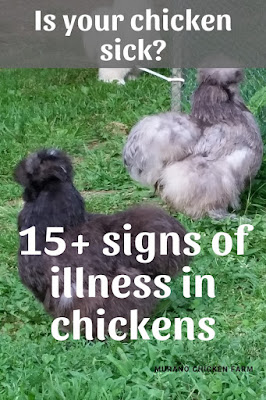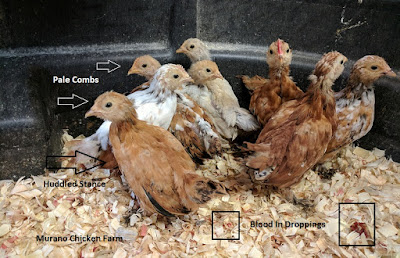There are lots of signs that will indicate that your chicken is sick. Sometimes it's the chicken themselves, like their stance or behavior. Other times you need to check their droppings or watch their eating habits to determine illness in your flock.
It can be tricky to know when a chicken first gets sick as they often hide it very well.
How to tell if a chicken is sick
It's important to notice all symptoms when examining a chicken for illness. Look your chicken over carefully and make note of anything that looks or feels differently than normal.
Try to observe the ill chicken for a while to see if she's doing anything odd or concerning. Both behavior and symptoms are important when figuring out what is wrong with your chickens.
For instance the chicken below is having a hard time holding her head in the normal position which indicates wry neck likely caused by a selenium deficiency.
Symptoms of illness in chickens:
A chicken who suddenly can't hold their head in a normal position can indicate wry neck. Especially is their neck is twisted so their head is turned backwards or up. It's sometimes call stargazing for this reason.
Looking dirty or scraggly outside of molting: External parasites like lice and mites can cause the feathers to look scraggly. Poor nutrition can cause the feathers to break off easily.
Having poop stuck to their bum feathers: Can indicate vent gleet, pasty butt in chicks, or diarrhea caused by worms.
Limping: A broken bone or bumblefoot are often the cause of a chicken limping.
Swelling of a body part (eye, belly, foot etc): an insect sting or bite, eye worm, foreign particle in the eye, water belly or bumblefoot all cause swelling of the affected area.
Nasal discharge: Can indicate respiratory illness.
Watery eye discharge or bubbles in the corners of the eyes: can also indicate respiratory illness.
Thick or crusty looking legs, raised scales on legs: Indicates scaly leg mites.
Runny, foamy or bloody poop: Internal parasites, and coccidiosis both cause a birds droppings to change.
Pale comb and wattles: Anemia which can be caused by parasites or illness. Look for mites between feathers and under wings. Check for eggs on the vent feathers
Sores or wounds: Caused by accidental injury or predator attack. White sores on the comb and wattles may be caused by fowl pox.
Coughing or gasping: Gapeworm, infectious bronchitis or other respiratory disease.
Bad breath: can indicate sour crop or impacted crop.
Behavioral signs of a sick chicken:
Standing huddled like they're cold: Usually indicates a sickness like coccidiosis or that the chicken is in pain.
Chicken standing by itself: Can often indicate a severe pecking order problem (look for wounds) or just a chicken that feels unwell and has no desire to socialize.
Standing in one place with eyes closed: Is a sign the chicken feels poorly and can be attributed to of many illnesses or an injury.
Not appearing interested in food or treats: Loss of appetite is always an indication of illness, though many digestive illnesses can cause a chicken to lose interest in regular feed.
Waddling like a penguin or otherwise walking funny: An egg bound hen waddles when she walks or a leg injury can cause a chicken to start walking differently.
Caring for a sick chicken
The first thing you do when you notice a sick chicken is to isolate her from the rest of the flock while you determine if what she has is contagious. This is called quarantining the chicken and is essential to prevent the spread of illness through the whole flock.
Plus, it's just really nice for her to have her own food and water and quite place to rest while she's feeling poorly.
Related reading: What to feed a sick chicken.
Try to determine what the problem may be by assessing the chickens symptoms. See an avian vet or the department of agriculture for blood tests for diseases like avian influenza or salmonella pullorum.
Once the illness is determined, treat the chicken and if the disease is contagious treat the rest of the flock also. Unfortunately treatments for all the above mentioned illnesses is beyond the scope of 1 post, but all of the clickable links above will take you to treatment articles about the noted illness.
Hopefully your chickens get well soon!
If you have a chicken just suddenly die without any obvious illness, here's how I do a postmortem examination on a chicken to try to determine the cause of death.
Want to know more about health and illnesses your flock may be exposed to? Click here for my other posts on chicken health!
~L
Want information on raising chickens sent right to your email weekly? Click right here to join my list and get new posts sent directly to you the day they're published ... plus, you'll also get the free download '25 Ways to save money raising chickens'.
I am not a veterinarian or other animal care professional nor do I claim to be. I am simply passing on information that has worked for me and my flock. This information is for entertainment purposes only and is not meant to treat or diagnose any medical condition. Please see a vet if your chicken is ill. Click for my full disclaimer.




No comments:
Post a Comment